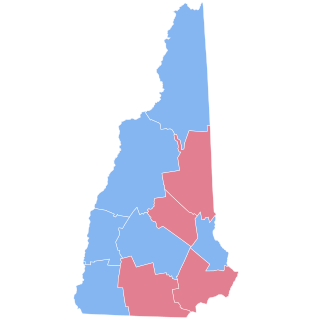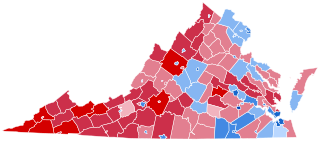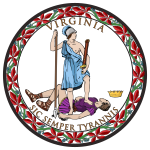
From January 14 to June 8, 2004, voters of the Democratic Party chose its nominee for president in the 2004 United States presidential election.

The 2004 Iowa Democratic presidential caucuses were an election held on January 19 as part of the United States presidential primary. They were the first major test of some of the leading contenders for the Democratic Party's nomination as its candidate for the 2004 United States presidential election.

Mini-Tuesday was the name given to the February 3, 2004 U.S. presidential primary where several states, which to that point had participated in "Super Tuesday," cast their votes for the Presidential nominees of the 2004 Presidential election. Mini-Tuesday was also called Super Tuesday I. With the large number of states moving their election dates up to Mini-Tuesday for the 2008 election cycle, pundits have largely shied away from using the term again, instead choosing to reappropriate the term "Super Tuesday" to better represent the primaries held on that approximate date. The date is also known as "Super Duper Tuesday," "Giga Tuesday," and "Tsunami Tuesday," among others, with the term "Mini Tuesday" falling to apparent disuse for the time being.

The 2004 United States presidential election in California took place on November 2, 2004, and was part of the 2004 United States presidential election. Voters chose 55 representatives, or electors to the Electoral College, who voted for president and vice president.

The 2004 United States presidential election in Illinois took place on November 2, 2004, and was part of the 2004 United States presidential election. Voters chose 21 representatives, or electors to the Electoral College, who voted for president and vice president.

The 2004 United States presidential election in Pennsylvania took place on November 2, 2004, and was part of the 2004 United States presidential election. Voters chose 21 representatives, or electors to the Electoral College, who voted for president and vice president.

The 2004 United States presidential election in New Hampshire took place on November 2, 2004, and was part of the 2004 United States presidential election. Voters chose four representatives, or electors to the Electoral College, who voted for president and vice president.

The 2004 United States presidential election in Virginia took place on November 2, 2004, and was part of the 2004 United States presidential election. Voters chose 13 representatives, or electors to the Electoral College, who voted for president and vice president.

The 2004 United States presidential election in South Carolina took place on November 2, 2004, as part of the 2004 United States presidential election which took place throughout all 50 states and D.C. Voters chose eight representatives, or electors to the Electoral College, who voted for president and vice president.

The 2008 United States presidential election in Iowa took place on November 4, 2008, as part of the 2008 United States presidential election. Voters chose seven representatives, or electors to the Electoral College, who voted for president and vice president.

The 2008 Oklahoma Democratic presidential primary, part of the process of selecting that party's nominee for President of the United States, took place on February 5, one of the many nominating contests of 2008's "Super Tuesday". The primary election chose 38 pledged delegates to represent Oklahoma at the 2008 Democratic National Convention. The remainder of Oklahoma's 47 delegates consisted of unpledged superdelegates not bound by the results of the primary. The election was a closed primary, meaning that only registered Democrats could vote in this election. Hillary Clinton won the primary by a significant margin.

The 2004 Arizona Democratic presidential primary took place on February 3, 2004, as part of the 2004 United States Democratic presidential primaries. The delegate allocation is Proportional. the candidates are awarded delegates in proportion to the percentage of votes received and is open to registered Democrats only. A total of 55 delegates are awarded proportionally. A 15 percent threshold is required to receive delegates. Frontrunner John Kerry won the primary with former general Wesley Clark coming second.

The 2004 presidential campaign of Dennis Kucinich, House Representative of Ohio and former mayor of Cleveland, began in February 2003, with a formal announcement made in June. Ralph Nader praised Dennis Kucinich as "a genuine progressive", and most Greens were friendly to Kucinich's campaign, some going so far as to indicate that they would not have run against him had he won the Democratic nomination. However, Kucinich was unable to carry any states in the 2004 Democratic Primaries, and John Kerry eventually won the Democratic nomination at the Democratic National Convention.

The 2008 United States presidential election in Virginia took place on November 4, 2008, which was part of the 2008 United States presidential election. Voters chose 13 representatives, or electors to the Electoral College, who voted for president and vice president.

The 2008 United States presidential election in South Carolina took place on November 4, 2008, and was part of the 2008 United States presidential election. Voters chose eight representatives, or electors to the Electoral College, who voted for president and vice president.

The 2004 Washington Democratic presidential caucuses were held on February 7, 2004. The Caucus is open to registered Democrats and Independents. The delegate allocation is proportional, the candidates are awarded delegates in proportion to the percentage of votes received. A total of 76 delegates are awarded proportionally. A 15 percent threshold is required to receive delegates. No actual convention delegates are awarded at the caucuses, rather each precinct caucus chooses delegates to attend the County Convention.

The 2004 Wisconsin Democratic presidential primary took place on February 17, 2004 as part of the 2004 Democratic Party presidential primaries. The delegate allocation is Proportional. The candidates are awarded delegates in proportion to the percentage of votes received and is open to registered Democrats only. A total of 72 delegates are awarded proportionally. A 15 percent threshold is required to receive delegates. John Kerry won the primary with John Edwards coming in second.

The 2004 Maryland Democratic presidential primary took place on March 2, 2004 as part of the 2004 Democratic Party presidential primaries. The delegate allocation is proportional; candidates are awarded delegates in proportion to the percentage of votes received, open to registered Democrats only. Frontrunner John Kerry won the primary with former Senator John Edwards coming in a distant second.

The 2012 United States presidential election in Virginia took place on November 6, 2012, as part of the presidential election in which all 50 states plus the District of Columbia participated. Virginia voters chose 13 electors to represent them in the Electoral College via a popular vote pitting incumbent Democratic President Barack Obama and his running mate, Vice President Joe Biden, against Republican challenger and former Massachusetts Governor Mitt Romney and his running mate, Congressman Paul Ryan.

The 2020 West Virginia Democratic presidential primary was held on June 9, 2020 alongside the Georgia primary, as part of the Democratic Party primaries for the 2020 presidential election. It was originally scheduled for May 12, 2020, but was moved to June 9 due to the COVID-19 pandemic. The West Virginia primary was a semi-closed primary, with the state awarding 34 delegates to the 2020 Democratic National Convention, of whom 28 were pledged delegates allocated on the basis of the primary results.






















